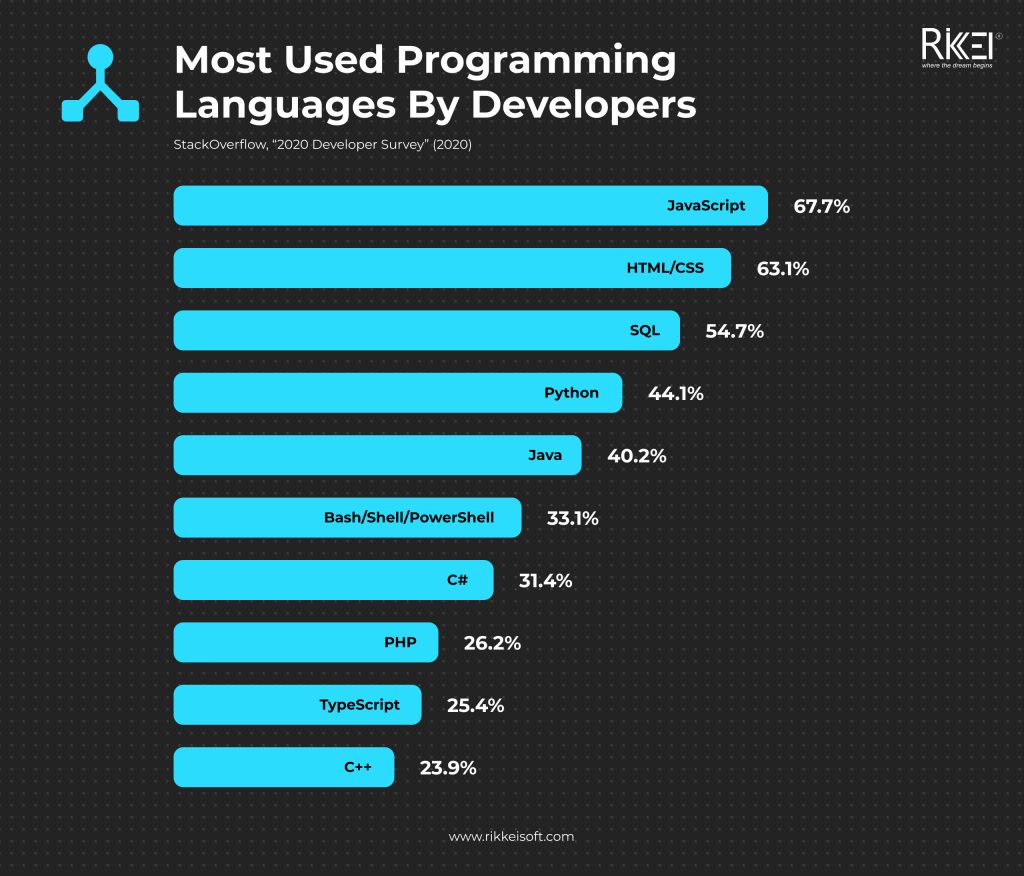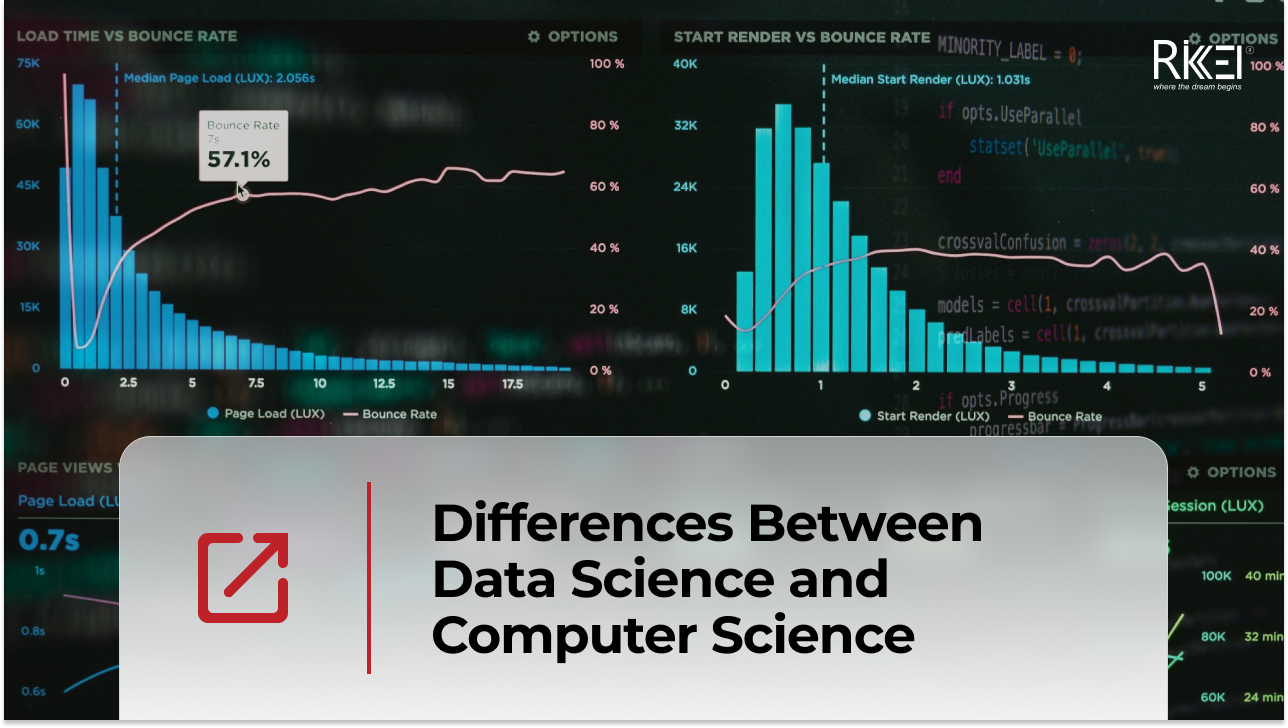10 Best Programming Languages for Finance & FinTech
Contents
Programming is a process of writing a language to make a computer perform certain instructions. This process is familiar to following the cooking recipe with an order list of requirements and actions. The “recipe” to build financial mobile apps nowadays is similar and more approachable as there are many programming languages available for coders.
Finance and FinTech are always receptive to advanced technologies and innovations. Therefore, programming for finance is a crucial undertaking that requires skillful developers to know diversified finance coding languages.
This article will help you learn more about programming for finance and some prominent programming languages.

Best Programming Languages for Finance & Fintech in 2023
1. Python
Python is one of the most intuitive and general-purpose languages in coding for finance. This programming language is famous for all developers because of its readability and flexibility to many applications regardless of the projects’ scalability. Here are some advantages that coders can utilize when using Python for their projects:
- Clear and simple syntax to use.
- Familiar with many spheres, such as banking, data analytics, financial, and technology industries.
- Easy programming language for novice programmers.
- Easy to scale the projects.
In addition, Python’s power and functionality made it more useful in in-depth research, artificial intelligence, machine learning and blockchain, which are the key technologies in developing finance and fintech apps. Python is also the best programming language for quantitative finance With these benefits, developers are likely to have more than 51% opportunity to get a job when they know Python, according to HackerRank.
Read more: Cybersecurity in Fintech: Standards & Solutions for Safe System
2. Java
Java is another top-ranked finance coding language because of its cross-industry popularity when released in 1995 as the core part of the Sun Microsystems Java platform. This coding language is friendly, object-oriented and can deal with significant amounts of data. Java has been used for over 25 years, but it remains the first choice even as new and advanced programming languages emerge.
Here are some benefits when a project using Java in their product:
- Ability to run on multiple platforms and fields
- Have robust and easy-to-use security APIs
- Capability to use in cross-platform
- Provide unmatched stability for developing
Finance and FinTech requires a highly protected system so that Java will be the preferred option if you want to to create front-end applications. For instance, Java is still the primary coding language in the banking industry as it is secure, resilient, and able to handle vast amounts of data
3. JavaScript
JavaScript is one of the most outstanding programming languages, as it is used for making web pages and front-end developments. With JavaScript, developers can make your website look more engaging and interactive to enhance users’ experience.
For example, most of the ubiquitous functions from the websites that we use in our daily habits come from JavaScript. Moreover, there are many benefits from using JavaScript for your financial product that we can see, including:
- Can not be easily attacked and fraud detection.
- Provide excellent compatibility, portability, and scalability for the development.
- Offer cross-platform performance.
- Ability to quickly process and analyze large amounts of data.
Differences between Java and JavaScript
| Java | JavaScript |
| Slightly more complex to use | Easier for starters to use |
| Object-oriented programming language | Object-based scripting language |
| Mainly used in back-end | Used for both back-end and front-end |
| Require a large amount of memory | Require less amount of consumption |
| Is a standalone language | Incorporated into HTML program for operation |
4. Scala
Scala is a programming language for general-purpose programming. This coding language was created to work closely and sort out Java’s inherent issues. From that, Scala is widely used for various purposes like web development, big data processing, and distributed systems.
Scala code is simple and easy to read, allowing coders to create complex systems with minimal effort. Scala also integrates seamlessly with Java and allows developers to use existing Java libraries in their projects. Furthermore, the language’s type system helps developers to avoid common programming errors.
By inheriting Java and improvements, Scala is specially applied to finance-related activities, such as:
- Algorithmic Trading: Scala’s reactive programming model helps it deal with large volumes of data quickly and efficiently, providing the foundation for high-performance algorithmic trading.
- Risk Management: By combining predictive analytics with machine learning algorithms, Scala can help financial firms identify potential risks and employ proactive strategies.
- Portfolio Optimization: Using machine learning algorithms, data mining techniques, and mathematical optimization helps Scala optimize and manage portfolios more accurately and efficiently.
- Credit Analysis: Scala can help streamline credit analysis by quickly extracting relevant data from the organization’s databases. This helps reduce errors and improves the speed and accuracy of credit decisions.
Read more:
Healthcare App Development 101
5. C++
C++ is a programming language created in 1979 from a college thesis project. C++ is a fast programming language as it is a compiled language and is mainly used in systems programming and embedded systems.
To be specific, systems programming is about creating and writing computer programs that allow computer hardware to communicate with users and programmers. Moreover, C++ is mainly used in embedded systems, a combination of software and hardware designed for specific functions.
Here are some applications when using a C++ programming language in finance:
- Allows improving performance, scalability, and reliability of financial applications.
- Provides greater control over the memory management of applications, makes it easy to write efficient code and reduces the memory footprint.
- Has low runtime overhead to offer quicker response times and better quotation accuracy compared.
- Offers robust security features to help financial applications secure and comply with applicable regulations.
- One of the common programming languages to build advanced financial platforms in the blockchain.
Read more: 10 Key Software Development Methodologies
6. C#
C# is used for general-purpose programming, creating applications for Windows, websites, and the Cloud. C# is a popular choice for enterprise application development, desktop application development, web services, and even games.
C# is an easy-to-learn language and offers developers the power to create robust applications quickly. Its syntax is based on C and C++, but it is easier to read and write. C# also supports object-oriented programming as the code can be reused, and projects can easily be maintained over time.
Using C# helps developers to save more time and other benefits, including:
- Greater security: C# helps to prevent mistakes, ensuring that the application’s financial data remains secure.
- Higher scalability: Due to its managed memory system, C# provides for reliable scalability of the app.
- Reliable performance: C# helps to reduce latency and provide faster execution times by using static compilation to convert source codes into native instructions.
- Cross-platform: Due to its compatibility with .NET Core, C# is supported across all platforms, including Windows, Linux and Mac.
7. React JS
React JS is a JavaScript library created by Facebook for building user interfaces. This programming language allows developers to create large web applications and change without reloading the page. React JS also uses components that help to separate UI into independent and reusable pieces of code.
Although React JS is mostly used for front-end development, it can also be used for server-side rendering, enabling more efficient loading times for webpages. Therefore, a financial website with a huge amount of data needs React JS for the loading process. Here is why React JS is a crucial language in coding for finance:
- Helps create dynamic and interactive charts, diagrams, and graphs to help visualize complex data sets in finance.
- Automates tedious or repetitive tasks, which saves time and effort.
- Create efficient workflows by allowing developers to create reusable components that streamline the development process.
- Allows finance companies to create applications that can quickly scale with the business.
- Offers robust security features that help to protect a company’s sensitive financial information.
8. Ruby
Ruby was an old-aged programming language designed and developed by Yukihiro Matsumoto in Japan in the 1990s. This coding language supports multiple programming paradigms, including procedural, object-oriented, and functional programming.
Ruby is extensively used in numerous web developments like Rails and Sinatra – two popular web development frameworks written by Ruby to build web applications. It is also popular among data scientists because it makes complex data manipulations easier. Furthermore, it can be used to build native desktop apps and games.
Regarding Ruby in finance, this coding language can be very useful in the stock trading industry. Ruby can be used to automate and streamline processes. For example, traders can use Ruby to create custom algorithms that analyze data and provide insights on how to enter and exit the market.
Furthermore, Ruby can be used in quantitative analysis. It can create efficient backtesting systems which allow analysts to run simulations on different strategies to find the most profitable ones.
9. VBA
VBA stands for Visual Basic for Applications and is a programming language used to automate tasks and create complex applications. VBA is also an integrated development environment (IDE) from Microsoft used to develop custom forms, macros, and user interfaces for applications.
Furthermore, this coding language can interact with other applications, such as Microsoft Office applications like Word, Excel, and Access. With VBA, it’s possible to generate reports, control other applications, and automate tasks that require a high degree of detail.
Here are some benefits when using VBA in your financial product:
- Automation in Financial Tasks: VBA enables financial professionals to program the software to do mundane tasks such as running calculations and updating spreadsheets with just a few lines of code.
- Enhanced Reporting: VBA can also generate customized reports that allow users to analyze and interpret data more effectively.
- Improved Security: VBA secures data storage and implements security protocols.
- Increased Efficiency: VBA can be used to streamline the process of financial analysis. Therefore, users can quickly and efficiently identify trends, calculate returns, and generate reports.
10. SQL
SQL is the coding language that stands for Structured Query Language. SQL is different from other programming languages mentioned here. Specifically, developers will not directly use SQL to build a website or an application. Still, this programming language harnesses and manipulates databases, specifically in the finance and fintech industry.
As finance and fintech firms generate a huge amount of data, SQL is a programming language for business, marketing, sales, and finance professionals to store data and make strategic analyses. Therefore, SQL is mainly used as a crucial part of data processing platforms and statistical modeling for big projects.
For example, a fintech firm can use SQL to store and analyze users’ data. By doing so, managers can identify users’ behavior and have clear insights into demand or consumption patterns.
Conclusion
Programming languages have become indispensable tools in the world of finance and the FinTech industry. It is hard to know the best programming language for finance, but each language plays a specific role in building a complete financial product. With the increasing complexity of finance and finTech, mastering a programming language is becoming essential for success.
More From Blog

October 28, 2025
Australia’s Fintech Revolution: Trends Shaping the Future of Digital Finance
Australia has emerged as one of the most dynamic fintech hubs in the Asia-Pacific region, driven by strong consumer demand for digital financial services, supportive government regulations, and the widespread adoption of innovative technologies. As the industry matures, the imperative for digital transformation has become unmistakable: fintechs and financial institutions alike are under pressure to […]

August 12, 2025
AI and Big Data in Building Smart Insurance Platforms
The insurance industry is now standing at a pivotal moment in its digital evolution. Traditional insurance models built on historical data analysis and reactive risk assessment are rapidly giving way to intelligent, predictive platforms powered by artificial intelligence and big data analytics. This transformation represents more than technological modernization; it’s a fundamental reimagining of how […]

July 23, 2025
Insurtech’s Game-Changing Trends: How AI and Digital Transformation Are Reshaping Insurance
The financial technology sector is experiencing unprecedented change, making it essential for business leaders and technology professionals to stay ahead of emerging innovations. Throughout 2025, insurance technology (insurtech) has emerged as a powerful catalyst for change, fundamentally altering how insurance providers conduct business, engage with clients, and assess risks. This technological evolution represents more than […]

April 4, 2024
Big Data Performance: Maximize Your Business Value
In today’s data-driven world, organizations are constantly generating and collecting immense amounts of data to understand their customers more deeply. This data, often referred to as “big data,” holds immense potential for organizations to seek opportunities and overcome challenges. But accessing and analyzing big data isn’t enough to have proper strategies; organizations must pay attention to […]

April 4, 2024
How Real-Time Data Analysis Empowers Your Business
In today’s fast-paced business landscape, the ability to quickly make data-driven decisions has become a key differentiator for success. Real-time data analysis, the process of analyzing data as soon as it’s generated, has emerged as a powerful tool to empower business across industries. By leveraging real-time data analysis, organizations can gain timely and actionable insights, […]

April 4, 2024
Differences Between Data Science and Computer Science
Data Science and Computer Science are distinct fields overlapping in certain areas but have different focuses and objectives. The article below will help you clearly understand the differences and the close connection between the two fields. What is Data Science? Data Science is an interdisciplinary field that combines scientific methods, processes, algorithms, and systems to […]

